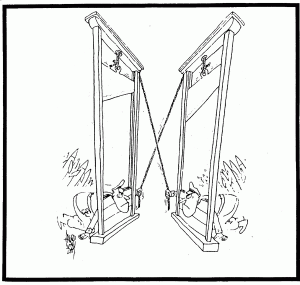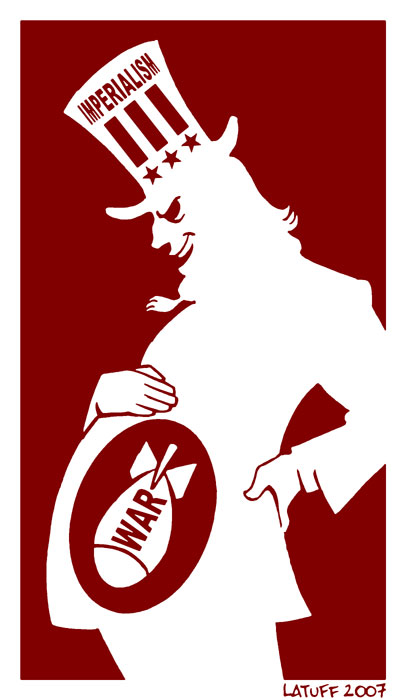
As smaller capitalists are being eradicated by the bigger capitalists, and the workers are not yet ready to take matters into their own hands, a return to protectionism is likely, as smaller capitalists would love to reinstate tariffs as a way to protect themselves against cheaper goods that are being imported from places like China or India.
Here's something from Marx's "Communist Manifesto":
Of all the classes that stand face to face with the bourgeoisie today, the proletariat alone is a genuinely revolutionary class. The other classes decay and finally disappear in the face of Modern Industry; the proletariat is its special and essential product.
The lower middle class, the small manufacturer, the shopkeeper, the artisan, the peasant, all these fight against the bourgeoisie, to save from extinction their existence as fractions of the middle class. They are therefore not revolutionary, but conservative. Nay, more, they are reactionary, for they try to roll back the wheel of history. If, by chance, they are revolutionary, they are only so in view of their impending transfer into the proletariat; they thus defend not their present, but their future interests; they desert their own standpoint to place themselves at that of the proletariat.

Capitalism has created a world market through the process of "globalization" - that's great, but as capitalism has found a new, better "host" in Asia, the western people are experiencing a huge drop in their standard of living. Apart from a few oligarchs, and especially multinational corporations, the majority of the population is suffering. Will the workers rise up? In the near term, that seems unlikely.
Most of the protests we've seen so far are not "anti-capitalist", they are simply demanding a "social-democratic" version of capitalism. However, this version of capitalism is not possible anymore, as the western nations cannot compete against the likes of China and India under such terms: Why would any capitalist invest his capital in the West, and share some of the profits with the workers (giving them higher wages, health care, public education, etc.), when he can invest his capital in Asia, and keep almost all the profits for himself?
Sure, there are many exceptions to this trend - for example Germany has been able to counteract it thanks to its higher quality of manufacturing and its superior technical "know-how", which make German products very competitive, despite the higher labour costs. But this is just an exception - the general trend is "the end of the "social-democratic" version of capitalism, with "neo-liberalism" as the only version that is competitive enough (as it breaks the working class down to coolie status).
But what about the other nations? We've already mentioned that they are all engaged in money-printing ("currency wars') in order to bail-out the banks and indirectly reduce the wages of the workers, thus making them "more competitive".
But as they are still failing to "restore their competitiveness", protectionism is a rising trend - here's a WTO report:

Crisis Threatens to Increase Protectionism: WTO
The economic crisis threatens to increase protectionism as governments think more on a national than an international level, Pascal Lamy, Director General of the World Trade Organization (WTO) told CNBC Thursday.WTO in right - " the less they co-operate on international issues, the more difficult exiting this global crisis will be". Then again, capitalism has never been about "cooperation" between the nation-states , it's always been about them competing against each other, , over economic and political power ("law of the jungle").
He added that it is now much more difficult to get big players such as the US and China to commit to agreements than a few years ago, and warned of “increasing protectionism pressures” and a “vicious circle” if countries don’t co-operate.
“We are in a vicious circle where crisis erodes the capacity of governance to cooperate well as the necessity of co-operation increases,” Lamy said.
“The paradox being that the less they co-operate on international issues, the more difficult exiting this global crisis will be.”
“I’m afraid we have to expect difficult times for the world economy at large. This leads national politicians to focus more on their numerous problems at home, with unemployment rising,” said Lamy.
“They are obviously less available for international cooperation.”

This cartoon colorfully demonstrates the doctrine of "mutual destruction", where two opposing factions destroy each other precisely because of the competition between them. The doctrine of "mutual destruction" became very popular during the "Cold War" between the U.S.A. and the former USSR, as each one of these two superpowers had the firepower to potentially to destroy the other.
However, this doctrine of "mutual destruction" can be applied on many occasions - and one of them is a return to protectionism.
After all, a return to protectionism was exactly what the nations-states did during the Great Depression of 1929: As the states are competing against each other, each one "attacks" the exports of the others, by imposing duties on their exports.
Protectionism is by nature NOT a "creative" policy - quite the opposite, it is a "destructive" policy. More - it is a "mutual destruction", as country A targets and hits state B's exports, which leads the state B to hit back at the exports of country A, etc.
Those who advocate a return to protectionism claim that they want to help domestic production to grow. But what protectionism actually does is not to help domestic production to grow, but to hurt the production of the other states. The end result is the collapse of global trade (this is what happened during the Great Crash of 1929). Many historians even believe that this collapse in trade, which exacerbated the crisis, was as a major cause for the outbreak of the Second World War.
- From an ideological standpoint, protectionism leads to the rising of nationalism (eg "we are Americans so we must buy American products", "we are English so we must buy English products", "we are German so we must buy German products", etc.).
- From an economic perspective, protectionism brought about an even greater collapse of world trade. Every worker essentially sided with his domestic ruling class, in hitting the workers of the other states. Rather than attack against their exploiters, the workers started hitting each other. And as each state's ruling class started attacking against the ruling classes of the other states, each state destroyed some parts of the other state's productive base, causing even more bankruptcies, and workers suffered even more, as unemployment spiked. However, in some sectors of the economy, this return to protectionism actually did create (or retained) jobs, but at the same time it deprived us of other jobs in other sectors, due to tariffs that were making a lot of exported goods not-competitive. Duties caused prices to rise, and ultimately consumption fell even further, as the workers could not afford to buy those expensive imported goods, and the depression deepened.
Unless we overthrow the capitalist system, which gives wealth and power to a handful of capitalists, who in order to maximize their profits go to Asia, leaving the West to rot, we can only expect poverty for the workers, and increasing trade wars, that could escalate to a full scale war (war is a topic that we shall discuss in more detail in future posts).
For now, here's something from N. Bukharin's "Imperialism and World Economy":
Both Bukharin and Lenin wrote about imperialism, heavily criticizing those who viewed militarism and war as a "deviation" from "normal" capitalism.
The most prominent theoretician of social democracy of that time, Karl Kaoutski, put forward this view. For Kaoutski, imperialism, the acquisition of colonies, and the spending of money on military weapons and supplies, was something that only benefited a few capitalists, not the bourgeoisie as a whole. This is the reason why 'every far-sighted capitalist', as Kautsky put it, 'must call to his comrades: Capitalists of the world, unite!'. Capitalists are of course adversaries, not comrades, and this is why they simply ignored Kautsky's cries and they have already given us two world wars. Kaoutski is the father of the theory of "Ultra-imperialism", which is followed today by some economists, including M. Hudson.
Bukharin and Lenin disagreed with that view - and rightly so: Imperialism is not a "deviation" from "normal" capitalism, but rather its "next logical step", the next stage in the system's evolution, as it becomes completely rotten.
What has changed since the time Marx presented us with his analysis of capitalism, argues Bukharin, is the appearance of gigantic capitalist enterprises, which control entire sectors of the economy of each country, eliminating or "swallowing" their competitors. They eventually reach a point when the "national" market is too small for the activities of these giant companies.
The economy becomes truly global, says Bukharin. Today, just like the times of Bukharin and Lenin so today, there are some who think that in a global economy, states and the competition between them are an "anachronism".
These views were wrong then, and they are wrong now as well. The capitalists need their own state, in order to defend their interests both at home and abroad. Capitalism is a system based on blind and chaotic competition for profits, and this turns one capitalist against the other in a race to secure more markets, more access to raw materials, sales and profits.
That's why Bukharin stresses that "It does not follow from this, however, that social progress has already reached a stage where "national" states can co-exist harmoniously. For the process of the intemationalisation of economic life is by no means identical with the process of the intemationalisation of capital interests".
Competition between the capitalists becomes global, and the various "ethnic groups of the ruling class" resort to their own state's power to promote their interests. The state has the power to pass laws that are in their favour, impose favourable taxation, impose tariffs on foreign companies or even to subsidize their "own" capitalists at the expense of its competitors (today's fights on subsidies between China, USA, and the EU is one such example). Above all, the state has at its disposal weapons and military force.
Here's Bukharin's take on it:
If state power is generally growing in significance, the growth of its military organisation, the army and the navy, is particularly striking. The struggle between state capitalist trusts is decided in the first place by the relation between their military forces, for the military power of the country is the last resort of the struggling "national" groups of capitalists.
[..]
And just as it is not true that low prices cause competition but, on the contrary, competition causes low prices, it is equally not true that the existence of arms is the prime cause and the moving force in wars (although wars are obviously impossible without arms) but, on the contrary, the inevitableness of economic conflicts conditions the existence of arms. This is why in our times, when economic conflicts have reached an unusual degree of intensity, we are witnessing a mad orgy of armaments. Thus the rule of finance capital implies both imperialism and militarism. In this sense militarism is no less a typical historic phenomenon than finance capital itself.






